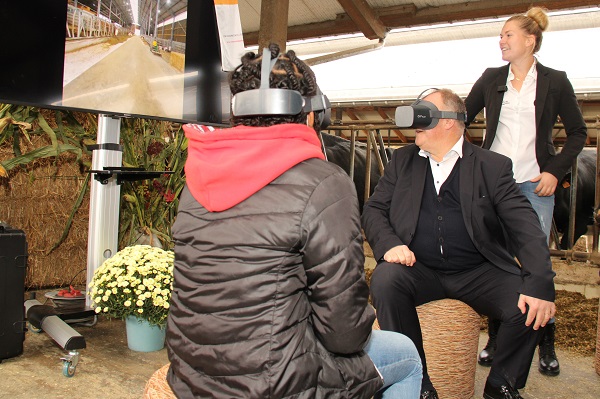 Romain Schneider, Minister of Agriculture, Viticulture and Rural Development, pictured with Lisa Jacqué, coordinator of the LEADER “Fro de Bauer” project;
Credit: MA
Romain Schneider, Minister of Agriculture, Viticulture and Rural Development, pictured with Lisa Jacqué, coordinator of the LEADER “Fro de Bauer” project;
Credit: MA
This year, the European LEADER programme (Liaison entre actions de développement de l'économie rurale; Links between actions for the development of the rural economy), which supports rural development programmes, is celebrating its 30th anniversary.
On this occasion, Luxembourg's Minister of Agriculture, Viticulture and Rural Development, Romain Schneider, presented the results of the LEADER initiative to the Diderrich family farm in Niederglabach (in the canton of Mersch) on Thursday.
Since 1991, the initiative has been coordinated within the ministry and operates through the offices of the five LEADER regions of Éislek (Oesling), Atert-Wark, Mëllerdall (Mullerthal), Miselerland (Moselle) and Lëtzebuerg West. The role of LEADER is to federate innovative initiatives in rural areas and to support these local initiatives in their development, in close collaboration with actors, municipalities and residents according to the “bottom-up” principle.
Minister Romain Schneider highlighted that through cofinancing, LEADER invests primarily in the creativity and ideas of citizens, with the objective of creating value-added projects for the inhabitants of rural areas.
The Agriculture Minister drew a very positive assessment of the dynamism of the LEADER initiative: “In 30 years, more than 575 projects in 60 municipalities have been carried out to the tune of €46.2 million. These projects were implemented while respecting the principles of collaboration, the spirit of innovation and the plurality of sectors”.
Among the known initiatives are agricultural projects (Téi vum Séi, Ourdaller Produkter, Musée Rural in Binsfeld, SoLAWa Atert-Wark, the first plant exchange in Stolzembourg...), tourism and economic projects (Mullerthal Trail, Lauschtouren am Miselerland, the development of the first mountain bike trails in the Oesling...), and educational and social projects (Fro de Bauer, HistoSchool, Landakademie, Super Senior...).
LEADER has thus had a catalytic effect in improving the quality of life in rural communities. In this way, the initiative has also made a decisive contribution to the creation of nature parks.
One of the most recent examples of an innovative and sustainable project launched through the LEADER initiative is the educational project “Fro de Bauer” (ask the farmer). Its objective is to make students aware of local agricultural production through classes dedicated to the subject and visits to farms.
This LEADER project was initiated by the Lëtzebuerger Landjugend a Jongbaueren asbl in 2018 in the Éislek, Mëllerdall and Lëtzebuerg West regions for an initial period of two years. Since then, more than 60 classes have been participating in the school project each year and demand is growing. The project has been extended and operates all year round, with funding from the Ministry of Agriculture, Viticulture and Rural Development.
In a spirit of innovation, the project managers have developed a new tool "Luxembourg agriculture through virtual reality glasses" with which pupils can visualise the activities that take place on an agricultural farm. During Thursday's presentation, the pupils of a cycle 4 class from Mersch Primary School and the Agriculture Minister were able to test these glasses.
According to Minister Schneider, “Fro de Bauer" is an “exemplary project that emphasises raising awareness of modern agricultural production methods and promoting our food. Because today's children are tomorrow's informed consumers”.
The minister added that following the pandemic, rural regions have experienced growing interest from the population, which will also have beneficial consequences for the LEADER initiative. Rural tourism and the promotion of local products are increasingly becoming the engines of new LEADER projects.
After 30 years of success, LEADER will continue its participatory bottom-up strategy by promoting innovation, partnership and cooperation with the sole aim of creating added value in rural regions by placing citizens at the centre of all actions.








